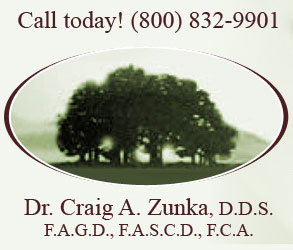What You Should Know About TMJ
What Is The Temporomandibular Joint (TMJ)?
The TMJ is commonly known as the jaw joint. There are two TMJ’s, one on each side of the face just in front of the ears. It is unlike any other joint in the body because it has both a hinge action, similar to the movement of the knee, and a sliding action, similar to the movement of the wrist, all contained in one joint.
What Is TMJ Dysfunction?
For reasons that vary from patient to patient, one or both temporomandibular joints may fail to move properly. This relatively common disorder is termed TMJ dysfunction.
What Are The Syptoms Of TMJ Dysfunction?
Each affected individual may experience one or different combinations of these common symptoms.
1. Pain of varying intensity around one or both ears, in the temples or in the neck.
2. Popping or grating sensations in the joint during movement.
3. Restriction of normal opening and jaw movements.
4. Severe or recurring headaches.
5. Inability to close the teeth together without pain, dislocation of the jaw or locking of the jaw.
6. Occasional hearing loss or pain in the ear.
7. Dizziness and ringing ears.
When pain from stress to the jaw muscles occurs, the condition is called myofascial pain syndrome.
What Causes TMJ Dysfunction?
Researchers don’t know for sure. TMJ dysfunction is a “new” disorder in that it has only recently begun to be described in the dental and medical journals. Many dentists/oral surgeons/orthodontists believe that there is usually more than one factor responsible for TMJ dysfunction. Some of the causes may be:
1. Trauma, such as an automobile accident.
2. Improper occlusion (bite)
3. Psychological factors, including stress.
4. Nervous habits, such as clenching and grinding of the teeth.
5. Neuromuscular imbalances.
6. Inflammation of the joint due to rheumatic fever.
7. Rheumatoid arthritis.
8. Osteoarthritis.
What Is Affected By TMJ Dysfunction?
Anyone at any age can be afflicted with TMJ dysfunction, but the condition seems more likely to occur as a person ages. It appears to be more common in women than men. Individuals suffering from rheumatoid arthritis are also more likely to exhibit TMJ symptoms.
Who Can Tell Me If I Have One Of These Conditions?
Your dentist /oral surgeon/orthodontist has the most specialized training to diagnose the existence and extent of TMJ dysfunction. To coordinate a complete plan of treatment, your dentist/oral surgeon/orthodontist may consult with other dental specialists, physicians, or psychologists.
How Is The Diagnosis Made?
The usual evaluation of the TMJ involves a complete oral examination. Your dentist/oral surgeon/orthodontist will probably check for tenderness in the muscles and try to detect any sounds made by the joint during opening. The jaw is evaluated for its range of motion, deviation to one side during opening, and any discrepancy in occlusion (bite).
There is usually a complete radiographic (x-ray) examination. X-rays allow the dentist/oral surgeon/orthodontist to see actual pictures of the joint components and their relative state of health. X-rays are usually taken with the jaw closed, open, and at rest, and sometimes while the jaw is moving.
Because tension sometimes plays a part in causing TMJ disorders, your dentist/oral surgeon/orthodontist may also want to know how things are going for you on the job, with your family, or in other potentially stressful circumstances.
What Type Of Treatment Will Be Neccessary?
Treatment for TMJ problems varies from simple measures to extensive therapy.
Sometimes the most important treatments are thing you can do for yourself: physical therapy; exercises; nutrition therapy; and the use of stress reduction techniques. Your dentist/oral surgeon/orthodontist may choose to start treatment with some of these approaches or to use them in support of more traditional dental work.
The most common dental treatment is the repositioning appliance, or splint which is used to change a patient’s occlusion (bite) and help the TMJ function correctly.
Psychological counseling often helps patients whose TMJ Condition may be callused by anxiety and depression. Antidepressant medication or medication for severe headaches may be part of the therapy.
If more conservative treatments fail, your dentist/oral surgeon/orthodontist may recommend oral surgery on the disk or other component of TMJ.
Your dentist/oral surgeon/orthodontist has the training and experience to determine the most effective treatment plan for you.


